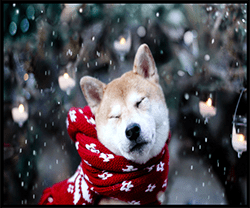
Winter Hazards for Outdoor Dogs
The winter months can pose many risks for our canine companions. Here are a few things to keep our pets safe this season.

Housing:Be
sure to provide adequate shelter and warmth for your outdoor dogs. A
dog house that is well insulated and large enough for your dog to stand
up and turn around is ideal. Anything larger than that makes it
difficult to keep your pet warm. For additional warmth, use old blankets
for bedding material. Blankets are ideal since they’re easy to remove
and wash to maintain a clean and dry environment all winter long. Even
dogs that are kept partially outdoors in kennels require protection from
cold windy weather. Provide a doghouse or secure a tarp onto a portion
of the kennel to create a windbreak.
Hydration:is
a must in winter conditions. Dogs cannot eat snow as a source of water
so water bowls need to be checked regularly or consider a heated water
bowl to maintain a source of unfrozen drinking water.
Exercise:pets
that exercise outdoors in the colder weather expend a lot of energy in
order to maintain normal body temperatures. If you are planning a hike
or some type of outdoor activity in the chilly weather, be sure to bring
extra food. Dogs kept outdoors need about 30% more food than they
require during the warmer months.
Antifreeze:can
leak from car radiators and is very tasty to dogs because of its sweet
flavor. Unfortunately, this chemical is also very dangerous and can
severely damage kidney function. If your pet has come into contact with
antifreeze, please contact Capitol Illini immediately!
Ice:may
be pretty, but it’s pretty hard to walk on. Slippery sidewalks are a
main source of injury during the harsh winter months. Our older pets
that may also have arthritis have more of a difficult time maintaining
balance resulting in injuries. Guide your pet to more of a grassy/sandy
or gravel area. Booties may also help with traction when venturing
outdoors
Grooming:your pet is important even
during the winter months. If left unkempt, matting on the fur can easily
trap in moisture and leave sores on the skin. Dogs with matted hair are
less able to maintain their body temperature. Hair between the toes can
pick up snow or ice which can irritate or lacerate the paws. Sidewalks
that have salt or de-icing chemicals can cause irritation and
inflammation to their paws.
Bring your dog indoors if he is
shivering. Pay particular attention to older dogs as well as puppies.
Older dogs will have special health considerations to address,
especially arthritis. The cold can aggravate arthritic conditions and
icy ground poses real dangers. Whenever possible, keep older dogs
indoors.
